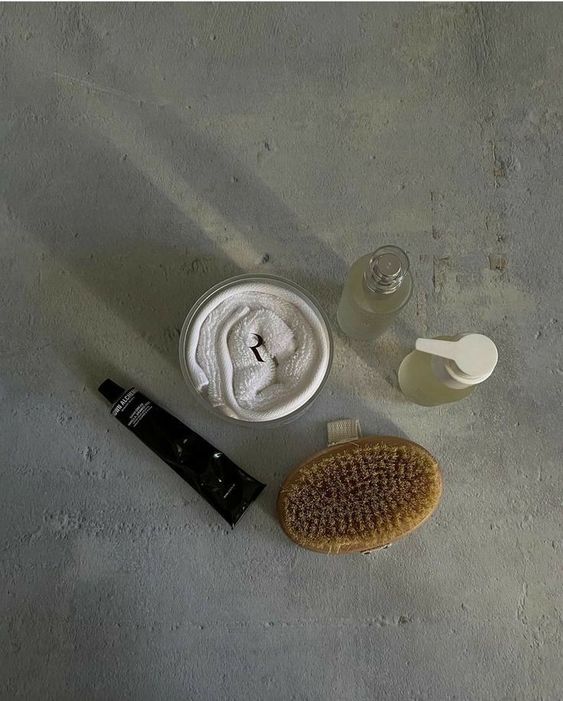
Alcohol is arguably one of the most controversial ingredients in skincare. It continually gets very bad press and yet, we always notice there is some of it lurking into our cleansers, toners, serums, moisturizers and even sunscreen. With so many innovations now available in the cosmetic industry you might wonder why companies haven't been able to replace it altogether. The answer is not easy as there is not one, but several types of alcohol and they all have different structures and functions. What is not debatable is the fact that alcohol consumption can potentially ruin your skin health and take away its glow. To better understand if alcohol should have a place in your dressing table, let's get into the nuts and bolts of alcohol chemistry and review its impact on the skin.
The Various Types and Compositions of Alcohol
An alcohol is an organic compound with at least a hydroxyl (-OH) group attached to a saturated carbon[1]. These substances can be identified by the suffix ol, which means retinol and tocopherol are classified as alcohols too. For practical purposes, we will breakdown alcohols into 3 main groups:
-
Simple alcohols
: have low weight molecules that readily evaporate. In other words, they are highly volatile. They are derived from fruits, cereals or are produced synthetically. These alcohols are used as antiseptics, deodorizers, disinfectants, astringents, antibacterial agents, penetration enhancers and solvents (even fat-soluble ingredients). They can also make the texture of thick formulas lighter, such as sunscreens, and provide a cooling/refreshing/tightening effect. Examples: ethanol (or ethyl alcohol), isopropyl alcohol (rubbing alcohol), SD alcohol (denatured alcohol), methanol and propanol. -
Fatty alcohols
: they contain long chains and are solid at room temperature. Their name can be a bit deceiving and have little to do action-wise to simple alcohols. They are actually closely related to fatty acids, but with the added OH molecule. Fatty alcohols can be derived from animal fat, coconut/palm oil or synthetized at the lab. They are added to cosmetics due to their emulsifying, emollient, humectant, occlusive or thickening properties. Behenyl alcohol, cetyl alcohol, cetearyl alcohol, glycol, isostearyl alcohol, lanolin alcohol and lauryl alcohol are a few examples. -
Aromatic alcohols
: like simple alcohols, these are extremely light weight. They separate themselves from the other categories by giving off a distinctive and attractive aroma. They can be obtained naturally from plants or produced synthetically. The main function of aromatic alcohols is to preserve the formula or add a nice fragrance to it. Examples: Benzyl alcohol, phenoxyethanol and essential oil components (citronellol, geraniol, limonene, linalool, etc.).
Can Alcohol Cause Skin Problems and Complications?
Yes and no. The effects ofalcohol on skin
are linked to the type and concentration used. Generally speaking, we can claim that fatty alcohols are safe to use. Vegetarians/vegans need to double check if they were ethically derived. If you have combination-oily skin types it is better to avoid them or use them in low concentrations as they could be clogging. Some people have reported sensitivity after applying certain fatty alcohols (like lanolin alcohol), so those with reactive complexions should be careful.The main concern comes from simple and aromatic alcohol usage. The first ones facilitate penetration of active ingredients by altering the integrity of the skin barrier and keratinocytes of the outermost layer of the skin[2][3][4]. This results in enhanced absorption of contaminants and increased transepidermal water loss that results in dermatitis and irritation. Such phenomenon is particularly noticeable after application of isopropyl alcohol/n-propanol-containing solutions and people with preexisting inflammatory conditions[3][4].
In other words, simple alcohols can strip the skin of its natural oils thus causing dryness, dullness, inflammation and reducing its natural protection against UV radiation. This is terrible news for all complexions, even those prone to greasiness and breakouts. Let's not forget that the more oils you remove from the surface of the skin, the more it will be stimulated into producing sebum. It is no surprise that acne patients that are addicted to drying cosmetics end up worsening their condition.
As shocking as this might sound, ethanol is toxic to skin cells and leads to apoptosis (programmed cell death)[5]. All this toxicity and water loss will undoubtedly give rise to the formation of free radicals and visible aging signs. Aromatic alcohols, on the other hand, are not completely risk-free. Even low concentrations can bring about skin irritation[6]. This explains why many dermatologists advise patients with inflammatory skin ailments to steer clear of these compounds, whether it is for perfume or preservative purposes.
Should We Ward Off Skincare With Alcohol?
Not really, but it comes down to your very unique skincare needs. To streamline this process for you, we have put together the following guidelines:
- Simple alcohols are a no-no for dry, sensitive skin and those suffering from inflammatory conditions (eczema, psoriasis, rosacea, etc.). The exception to this rule would be alcohol-based extracts. They would be so diluted once they are added to a formula, which won't cause any side effects.
- If you want to apply a formula with simple alcohols, provided you do not suffer from any of the above, make sure the maximum concentration is not higher than 5%. If the company is not able to provide this information, just avoid products that list alcohol as one of their first ingredients (or towards the middle if the list is long).
- We do not recommend alcohol usage for astringent purposes, so it is better to kiss goodbye your alcohol-containing toner.
- It is ok to use alcohol as a means to sanitize the hands (when water and soap are not available) and prep the skin before a cosmetic procedure. Do moisturize afterwards to replenish the lost oils.
- Grain alcohol should be your preferred simple alcohol.
- If unsure about the application of simple alcohols in skincare, you can always request samples or choose to test the products under the 30-day money back guarantee.
- When aromatic alcohols are added as preservatives, they might irritate delicate skin types. It is best to look for products that contain gentler, natural preservatives.
- Aromatic alcohol-based fragrances are not suitable for those allergic to essential oils.
- Fatty alcohols are excellent for moisturization purposes, though they could be a bit clogging for oily and acne-prone complexions.
- Lanolin alcohol is contraindicated for people who have previously reacted to lanolin, but it is ok to apply the other fatty alcohols.
-
Alcohol free skincare
is a rare find. There is no need to obsess about its presence in skincare. Just stick to our recommendations to get the most out of your beauty routine.
Alcohol Consumption & Its Effect On Your Skin
The addition of alcohol to skincare products can sometimes be beneficial, but the same can´t be said about ingestion of alcohol. No one can deny that certain alcoholic beverages, such as wine, contain a considerable amount of antioxidants. Nevertheless, the negative impact that alcohol has on the skin cancels out its properties. One of them is well known: inside-out dehydration. So,
how does alcohol make you dehydrated
?The process involves blocking the release of vasopressin or antidiuretic hormone (ADH) from the posterior pituitary lobe[7][8]. This hormone causes the kidneys to reabsorb water, whenever it senses its volume is below normal, and return it to the circulation in order to maintain bodily fluids balance[7][8].
Alcohol acts the opposite way and will make you lose all that precious water in the form of urine. In other words, alcohol is an extremely potent diuretic[7][8]. All this water loss affects the hydration levels of the skin which can be observed/felt as dryness, sensitivity, roughness, frazzled look as well as fine lines and wrinkles. Dehydration is not the only cutaneous side effect related to alcohol intake. Most of us have heard about “
allergy to alcohol
”.It might be inappropriate to make such a claim, the so-called allergy is often linked to alcohol additives and not alcohol per se, but alcohol can certainly trigger histamine levels and promote even more inflammation and itching in dermatitis, psoriasis, and rosacea patients[9].
Speaking about rosacea, alcohol can also exacerbate it because it stimulates dilation of blood vessels thus producing a “flushy appearance”[9]. Redness and telangiectasias (broken thread veins) are likewise common in chronic booze consumers. Alcohol acts as a suppressive agent of the immune system and creates a hotbed for pathogenic bacteria and fungi[9]. The byproducts of alcohol metabolism are toxic to the liver, which explains why those who abuse alcohol develop jaundice and hyperpigmentations[9].
Since alcohol gets in the way of essential nutrients absorption, namely vitamins A, C, the B-complex and zinc, the skin will be prone to severe dryness, sensitivity, premature aging, keratosis pilaris, seborrheic dermatitis and angular cheilitis (cracked mouth corners), among many other conditions[9]. Women know this all too well: alcohol is an endocrine disruptor[10]. When the hormones go out of whack, the skin suffers greatly. And we haven’t even touched on the terrible sugar spikes that alcohol produces; sugar equals more acne and aging through the process called glycation[11][12]. The microbiota (friendly flora) is not safe either as alcohol adversely changes its frail make-up, hence generates inflammation, oxidative stress, toxicity, and inflammation[13]. To top it all, alcohol is classified as a skin carcinogen, and this includes melanoma, basal cell and squamous cell carcinomas[9].
Should We Never Drink Alcoholic Drinks Again?
The answer to this question is deeply personal, though we believe that moderate alcohol consumption, if you must, won’t hurt. By moderate we mean: 1 or less drinks per day for women, and less than 8 drinks per week, and 2 or less drinks daily for men, and less than 15 drinks per week[14][15]. If you are a heavy drinker, we advise you to get the necessary help immediately. For those who just want to minimize the side effects of the occasional alcoholic drink, we recommend implementing the following measures:
- Always prefer beverages with low alcohol % such as beer and wine.
- If you want to have some spirits, go for those that are light-colored and avoid the dark ones.
- Drink water in a 1:1 ratio. This means, for example, that for every cup of wine you should drink one glass of water.
- Maximize your intake of high-fiber and mineral-rich foods like algae/seaweed, vegetables, whole grains, and legumes before or while drinking alcohol.
- Make sure to include some healthy fats with your meals, avocado, olives, nuts & seeds, fish, etc., so as to reduce the impact of alcohol on your blood sugar levels.
- Thoroughly remove makeup and moisturize your skin before turning in.
- Apply a lavender roll-on on your temples to induce a deep and sound sleep.
- Treat yourself to a super hydrating and nourishing facial, at home or at the spa, the day after.
- Drink plenty of coconut water and green juices the next morning. Include lots of raw veggies with your meals and avoid processed foods.
- Go outside to breathe some fresh air and exercise outdoors to flush out the toxins.
Topically speaking, alcohol can be beneficial under certain circumstances. There is no need to freak out when you bump into an alcohol-based formula, provided it comes in the right form and concentration. The same can´t be said about the ingestion of alcohol. For those who enjoy drinking while they socialize, just keep it to 1-2 cups (and never drive while under the influence of alcohol). Whatever the total amount consumed is, you will have to implement steps to compensate for the water loss and prevent potential skin damage. The less alcohol you have, the better. To learn more about the best practices for your skin, make sure to follow us on Instagram, Facebook, Linkedin and Pinterest
References
[1] https://www.britannica.com/science/alcohol
[2] https://www.ncbi.nlm.nih.gov/pmc/articles/PMC2596158/
[3] https://pubmed.ncbi.nlm.nih.gov/27578266/
[4] https://www.annallergy.org/article/S1081-1206(21)00565-2/fulltext
[5] https://www.sciencedirect.com/science/article/abs/pii/S0741832902001982?via%3Dihub
[6] https://www.ewg.org/skindeep/ingredients/700697-BENZYL_ALCOHOL/
[7] https://www.afterdrink.com/alcohol-dehydration/
[8] https://www.abc.net.au/science/articles/2012/02/28/3441707.htm
[9] https://dermnetnz.org/topics/cutaneous-adverse-effects-of-alcohol
[10] https://www.ncbi.nlm.nih.gov/pmc/articles/PMC3767933/
[11] https://pubmed.ncbi.nlm.nih.gov/20620757/
[12] https://onlinelibrary.wiley.com/doi/10.1111/ijd.15390
[13] https://pubmed.ncbi.nlm.nih.gov/26695747/
[14] https://www.cdc.gov/alcohol/fact-sheets/alcohol-use.htm




